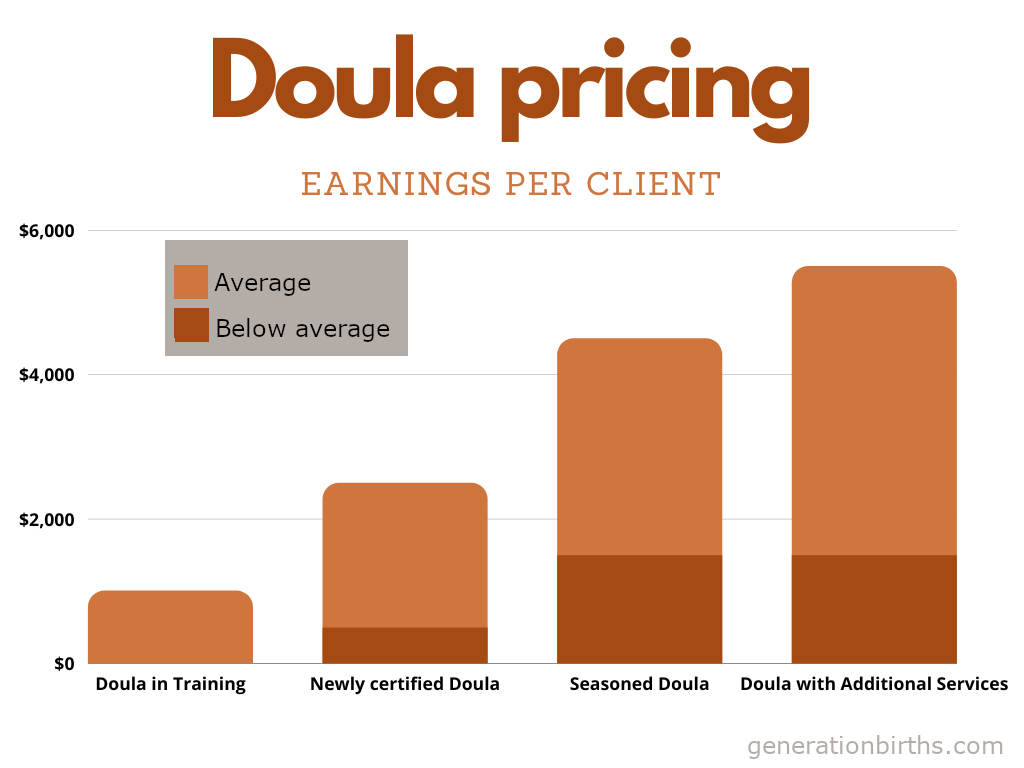While birth can be a magical and spiritual experience, it also can bring a lot of fear and anxiety for some. Whether you have given birth before, or this is your first time. Whether you plan on having a non-medicated birth, or a cesarean section, a home birth, or hospital birth it can be comforting to know that you have a team of people in your corner to help navigate your birth journey. What does a doula do and should a doula be included as part of your birth team?
A doula is a person present during labor and delivery, helping the laboring person every step of the way, and keeping you informed. A doula offers emotional and physical support, they advocate for your needs. They do not deliver babies, but help expectant people through the rigors of childbirth.
For those of us who have already given birth we have the advantage of prior experience. But every birth journey is different. A doula is there to help you through the entire process, adjusting to your needs as they arise. Doulas offer their support, guidance and knowledge from experience; before, during and after labor and delivery. They know your birth plan, usually because they help you devise it according to your desires and expectations. This plan usually includes a plan B, in case your birth journey deviates from the original course.

Doulas are typically trained or have extensive birth partner experience. Most have obtained certifications through a doula training program.
The word doula is derived from ancient Greek, meaning “those who serve”
What does a doula do?
A doulas job is to advocate for the birthing person, armed with the knowledge of the expectations and desires of their client. They can offer massages to relieve pain or pressure, help the laboring person change positions and provide comfort, provide breath and meditation techniques to calm and reduce pain, assist in transitions to hydrotherapy, allow breaks for the laboring person’s partner (should they have one), give reminders to hydrate and eat, keep medical staff informed of the wishes of their client.
Essentially the doula is at the service of the laboring person for whatever their need.

Most doulas have training, and experience in birthing practices. They know and understand the intricacies and nuances involved in labor and delivery. Your doula should be able to keep you informed about and help you understand medical practices that you may be unfamiliar with. This will help you make informed decisions regarding your care.
A doula should empower you. They should encourage you to trust and listen to your body. They should echo your wants and needs when you feel unable to. A doula will encourage you when you may be feeling exhausted from labor. Your doula should be empathetic, and reassuring.
A doula is typically present throughout the entirety of labor and delivery, taking breaks as necessary. As with other birth workers, a doula is on-call for your birth at all hours of the day. You decide together if you want your doula to be with you from early into the labor, or once things have sped up a bit.

Services a Doula Offers
Your doula should have prenatal visits with you. These serve several purposes. First, and most importantly it is to establish trust and a rapport with the client. This happens in the first meeting, which is usually free of charge. Subsequent visits are to agree on a contract, check on the progression of the pregnancy, establish a birth plan, discuss postpartum support, feeding options, and ensure that all involved are made aware of the birth plan (partners, midwives, obstetricians).
Postpartum doulas are another type of doula service you may consider. They specialize in the “fourth trimester”, or the period of time following birth. They have different training than a birth doula, and typically offer a variety of services as well. These can include breastfeeding assistance, recommendations for new parents facing postpartum depression, parenting courses, newborn care services, assistance in recovery from cesarean sections and more.
What a doula is not
As previously mentioned, a doula is not a medical professional. A midwife and a doula have different qualifications and functions at a birth (Midwife vs Doula). A doula’s job is not to perform medical procedures, administer medication or make medical decisions (although they likely have knowledge of medical practices surrounding birth). A doula should never judge their client’s birthing choices or push their client to make any medical decisions. Their job is only to ensure that their client is well informed, and able to understand the medical aspects of labor and delivery.
Not all doulas offer the same services, and most doulas are self employed. Be sure that you find a doula that fits your needs and makes you feel at ease.
The doula for you
How to pick a doula
Choose a doula who makes you feel comfortable and has a calming presence. This person will be with you through one of the most vulnerable and empowering moments of your life experience. They should be trustworthy, aware of the weight of their responsibility, and reasonably available to you when you have questions or concerns. And of course, able to drop everything to be present once labor commences.
Doula services and specialties
Different doulas offer different services and cater to specific needs. Some are trained specially in vaginal births after cesarean sections (VBAC deliveries). Some specialize in non-medicated or homeopathic birth. There are doulas who specialize in trauma informed services. Dulas can specialize in the births of multiples. Some doulas offer photography at the birth. Still others offer postpartum and breastfeeding services.
Most doulas will be willing to attend home births as well as hospital births. They will likely bring a bag of items to provide comfort and ease labor. This could include a yoga ball, massage balls, steripads. The list will likely vary depending on the doula and the location of the birth. Most doulas will offer suggestions as to what should be included in the birth bag of the expectant person as well.

Items that make you feel comfortable and at ease such as music, pillows, comfortable clothes, calming scents, etc.
Though there is no certification requirement to become a doula, most doulas choose to pass through a certification program. The requirements of these programs differ. Most certified doulas pass through a 7-12 hour childbirth education program, a 16 hour course of doula training, and attend 2-5 births.
There are other specific types of doulas, like postpartum doulas, who specialize in different medical transitions. Some doulas offer their services virtually. There are doulas who specially provide care for abortions or miscarriages. There are death doulas and even dog doulas. This article is specifically about birth doulas and their services.
What are the benefits of having a doula?
The World Health Organization (WHO) recommends that doulas attend all births globally.
Weighing the benefits
Just as every pregnancy journey is different, every birth story is also different. Some pregnant people have a partner, a parent, a sibling, all who are willing to support during the birth. Some expectant people are going it alone. Whatever your circumstances may be, the presence of a person whose sole purpose is to advocate and provide for you through your birth journey could prove invaluable.
Medical professionals such as nurses, doctors, and midwives may all be a part of your birth journey. But they are unlikely to be available to you throughout your entire labor. A partner might not be familiar with the medical practices of labor and delivery. They could need a rest, become overwhelmed, or be too emotionally connected to handle the demands of being a birth companion. A doula is trained to endure, support and encourage. They have the benefit of experience. This is their job after all. The benefits of having a doula certainly outweigh the costs.
Having a doula present during labor and delivery has proven to reduce anxiety in birthing people, reduce the event of medical interventions such as emergency cesarean sections and instrumental birth, reduce tearing or the call for episiotomy, decrease labor duration, reduce medical costs and improve the overall birth experience of their client.
Can I afford a doula?
Doulas can charge between $500 to $3,000 per birth depending on a number of factors. A new doula just starting out may charge less, and have less experience. Some doulas in training, or working toward their certification may offer their services for free to speed up the certification process. There are volunteer doula programs. Doulas in major cities or hubs will likely charge more.

Some doulas offer a payment plan option where you can cover the cost in installments, rather than pay in full upfront. There are also volunteer doulas who work at no cost. Some offer a sliding scale to charge their client what they are able to pay.
Am I covered?
Do insurances cover the cost of a doula
Most insurance companies do not cover the cost of having a doula. Some will cover part of the costs. It is recommended that you check directly with your provider to find the correct answer for you.
